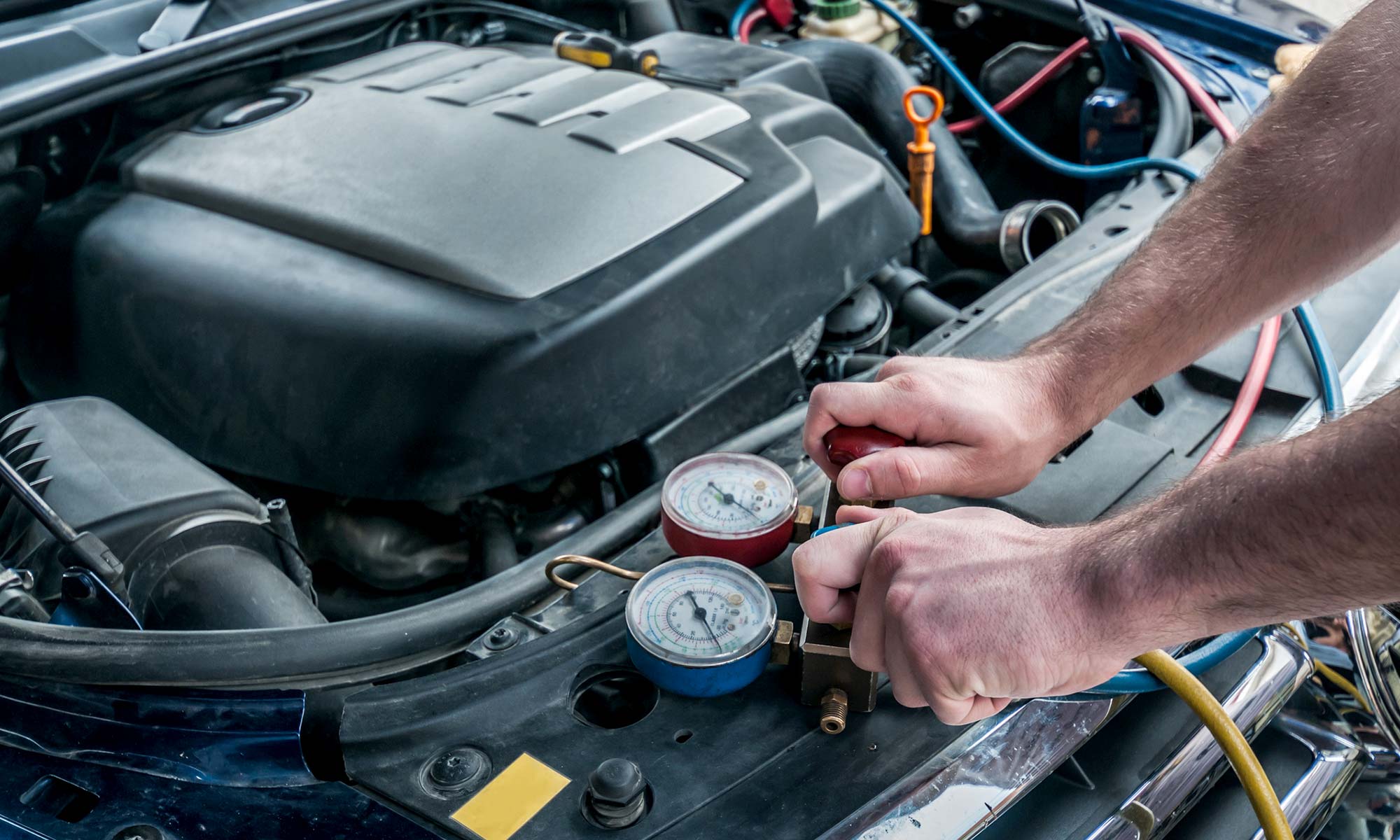¿Es necesario repostar freón cada año?

Cuando la temperatura comienza a subir, el sistema de aire acondicionado de su vehículo se convierte en un elemento indispensable para viajar cómodamente en verano. La brisa fresca de un aparato de aire acondicionado en funcionamiento puede ayudar a que viajes por carretera y la conducción diaria sea más agradable.
Para muchos propietarios de automóviles, cuando el aire acondicionado no funciona correctamente, una de las tareas de bricolaje más comunes es recargar el Freón En el vehículo. Este componente químico es directamente responsable de ayudar a enfriar el aire caliente dentro del sistema de aire acondicionado antes de enviarlo a la cabina del automóvil a través de las rejillas de ventilación del aire acondicionado. Sin embargo, si bien recargar el freón puede ayudar con algunos problemas del aire acondicionado, no siempre es la solución.
¿Es realmente necesario repostar freón cada año?
Como mecánico, los clientes me preguntan con frecuencia si necesitan “recargar” su aire acondicionado con un kit de carga de freón. A veces, esto puede ser una solución rápida, pero a menudo otros problemas pueden afectar la eficiencia de su sistema. Aire acondicionado del coche. Los componentes de su sistema de aire acondicionado deben recibir el mantenimiento adecuado para que todo el sistema funcione correctamente. Si un componente no funciona como debería, todo el sistema podría dejar de funcionar.
Conocer las causas más comunes de los problemas del aire acondicionado del vehículo y comprender qué es el freón no solo lo ayudará a ahorrar en un nuevo kit de recarga, sino que también puede ayudarlo a reconocer los signos de reparaciones más graves en el futuro.
¿Qué es el freón?
El freón es un refrigerante que utiliza su aire acondicionado para generar el aire frío que sale por los conductos de ventilación. También conocido como refrigerante R-22, el freón es un gas inodoro e incoloro que puede ser perjudicial para la capa de ozono si se filtra del sistema de aire acondicionado, según la EPA. Por este motivo, muchos automóviles fabricados después de 2003 ya no utilizan freón en el sistema de refrigeración de sus aires acondicionados.
Al igual que con otros productos químicos y lubricantes que se utilizan en el automóvil, es importante controlar los niveles de freón con regularidad. Un vehículo que se queda sin freón o con poco freón regularmente puede indicar una fuga en el sistema de aire acondicionado. Si cree que su vehículo tiene una fuga de freón, visite el taller de reparación certificado o el mecánico más cercano para realizar las reparaciones necesarias.
¿Por qué su aire acondicionado no enfría tanto como antes?
Cuando descubre que el aire acondicionado de su vehículo no funciona correctamente, existen algunas razones posibles para ello. Una de ellas podría ser que su automóvil simplemente se haya quedado sin freón y necesite recargarlo. Puede llevar su vehículo a cualquier mecánico certificado o centro de reparación para que lo hagan. También puede cargarlo usted mismo con un kit de carga para el hogar. Sin embargo, si eso no soluciona el problema, podría estar ante otro problema. Y sin la ayuda de un Plan de protección del vehículo de Endurance, podría terminar pagando estas costosas reparaciones por su cuenta.
Fugas de aire acondicionado
Si el aire acondicionado de su vehículo se queda sin freón constantemente, esto podría indicar una fuga en algún lugar del sistema. Uno de los principales problemas con esto va más allá de la capacidad del aire acondicionado de su automóvil para Te refresco en un día caluroso. Como se mencionó, el freón es increíblemente dañino para el medio ambiente y una fuga significa que su automóvil está expulsando una gran cantidad de este gas al aire. Si cree que su vehículo tiene una fuga, visite a un mecánico o a un taller de reparación para realizar las reparaciones necesarias del aire acondicionado lo antes posible.
Falla del motor del ventilador
Si el aire acondicionado de su automóvil expulsa aire caliente, esto podría ser una señal temprana de una falla en el motor del ventilador. Este ventilador se utiliza para enfriar su automóvil. Condensador de aire acondicionado Para que, a su vez, pueda enfriar el refrigerante del aire acondicionado. Si el ventilador no funciona, no obtendrá aire frío del aire acondicionado. Otra posible señal de falla del motor del ventilador es notar si su vehículo se sobrecalienta cuando enciende el aire acondicionado. Un olor a quemado que sale de las rejillas de ventilación a menudo puede ser una indicación de esto.
Filtro obstruido
Un filtro de aire obstruido también puede causar problemas con el aire acondicionado de su vehículo. Al igual que el sistema de calefacción, ventilación y aire acondicionado de su hogar, el filtro de aire de su automóvil toma el aire del exterior, lo filtra y luego lo enfría con un refrigerante. Si su filtro de aire está bloqueado, no absorberá el aire fresco, lo que hace que no salga nada por las rejillas de ventilación. Una forma de ayudar a mantener sus filtros de aire es limpiarlos con cada cambio de aceite para ayudar a garantizar que estén libres de posibles obstrucciones. Si no está familiarizado con la frecuencia con la que su vehículo necesita un cambio de aceite, consulte con su el manual del propietario para más detalles.
Problema con el radiador
El aire acondicionado de su automóvil es un sistema relativamente complejo y será una de las primeras cosas que deje de funcionar si tiene un problema más importante. Por ejemplo, si su radiador no funciona enfriar el coche o tiene poco refrigerante, el aire acondicionado puede dejar de soplar aire frío. Supongamos que nota que su vehículo se sobrecalienta cuando está en ralentí, así como la ausencia de aire frío del aire acondicionado. En ese caso, esto podría ser indicativo de un problema más importante en el radiador.
Falla del compresor
Si el compresor del aire acondicionado de su vehículo no funciona, esto podría provocar que salga aire caliente por las rejillas de ventilación. Cuando la computadora interna de su automóvil detecta un problema eléctrico con el circuito del compresor, generalmente apagará primero el aire acondicionado. Si se reinicia o reemplaza el compresor, esto generalmente solucionará el problema antes de que sea necesaria cualquier reparación del aire acondicionado.
¿Cuándo conviene repostar freón?
Si tiene un vehículo que utiliza freón y nota que ha dejado de expulsar aire frío desde la unidad de aire acondicionado, es posible que tenga niveles bajos de refrigerante. Diríjase al taller de reparación autorizado más cercano o compre un kit de recarga para el hogar para preparar su automóvil para el calor del verano. Y recuerde, si bien una recarga rápida puede ser todo lo que su automóvil necesita este verano, siempre que pueda descartar otros problemas potencialmente más graves, su vehículo no debería necesitar una recarga todos los años.
Preguntas frecuentes (FAQ)
- ¿Cómo puedo probar el aire acondicionado de mi automóvil?
Puedes probar el sistema de aire acondicionado de tu coche escuchando si hay golpes o chasquidos en el compresor cuando se activa el aire acondicionado. También puedes revisar todas las mangueras y correas para ver si tienen grietas o signos de fugas. Sin embargo, la mejor prueba que puedes hacer es simplemente activar el aire acondicionado y sentir si sale aire frío de las rejillas de ventilación.
- ¿Está bien conducir con un compresor de aire acondicionado defectuoso?
Si el compresor del aire acondicionado falla, por lo general es seguro conducir el vehículo. Sin embargo, debe asegurarse de que el compresor no se haya movido ni aflojado, ya que esto puede afectar otras partes del sistema de correas serpentinas de su automóvil. Cuando estas correas se aflojan o se tambalean, pueden dañar o dejar de activar otros sistemas esenciales de su vehículo.
- ¿Puedes recargar tú mismo el aire acondicionado de tu coche?
Existen kits de recarga que puede utilizar en su hogar para colocar refrigerante nuevo en su aire acondicionado. Cuando utilice estos kits, asegúrese de que todos los sellos estén bien apretados antes de comenzar a colocar la nueva carga de refrigerante en las líneas de su aire acondicionado. Algunos de estos gases son nocivos para el medio ambiente si se filtran a la atmósfera.
Mantenga su aire acondicionado funcionando con EnduranceVentajaTM
Si bien puede ser una causa potencial de un mal funcionamiento del aire acondicionado, recargar el freón de su vehículo todos los años no es una necesidad. Asegúrese de que todos los componentes de su aire acondicionado se mantengan en buen estado de funcionamiento antes de que el clima se caliente. Con la ayuda de un EnduranceVentaja Plan de protección automática, no solo puede proteger su vehículo de averías inesperadas de su radiador u otros componentes vitales, sino que también puede recibir hasta $1,500 cada año en cobertura de mantenimiento general.
Planes de protección Endurance, incluidos los tres niveles de EnduranceVentaja, También viene con un año gratis de Beneficios de Endurance Élite con beneficios aún más sorprendentes, como dos reparaciones o reemplazos de neumáticos por año, reemplazo de llavero y asistencia en carretera las 24 horas, los 7 días de la semana. Solicitar Un presupuesto gratuito y sin compromiso hoy mismo ¡Y vea cómo un plan de protección Endurance puede ayudarle a tener más confianza en el camino que tiene por delante!













Desde los 16 años, Keith ha estado inmerso en la industria automotriz, comenzando su carrera ayudando a su padre a reparar vehículos a una edad temprana. Keith ahora es dueño de su propio taller de reparación familiar certificado por ASE. A+ Cuidado del automóvilEn su tienda, se centra en construir relaciones de confianza con su comunidad a través de un servicio al cliente excepcional. Leer más Acerca de Keith.